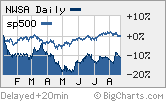 |
| Wall Street's "media bias": News Corp., like most major media stocks, has undeperformed when compared to the broader market this year. |
|
 |
| Why is News Corp. CEO Rupert Murdoch smiling? Maybe it's because he's discovered that online advertising is a rapidly growing business. |
|
|
|
|
|
|
|
|
|
|
|
NEW YORK (CNN/Money) � Welcome to the Internet, Rupert Murdoch. What took you so long?
Murdoch's media giant News Corp. (Research), which owns the Fox television network and movie studio, several cable stations and a worldwide portfolio of satellite television systems and newspapers, has made an aggressive move into online media lately in order to cash in on the Internet advertising boom that has lifted the fortunes of Google (Research) and Yahoo! (Research)
Last month, the company announced plans to buy Intermix Media, which runs the popular social networking site MySpace.com, for $580 million. It also purchased Scout Media, a sports news company with a significant online presence earlier this month for an undisclosed sum.
And Murdoch, the chairman and CEO of News Corp. has hinted that he's looking to do more deals.
During the company's fiscal fourth-quarter earnings conference call with analysts earlier this month, Murdoch said that "there is no greater priority for the company today than to meaningfully and profitably expand its Internet presence and to properly position ourselves to benefit from the explosion in broadband usage that we are now starting to see."
He added that News Corp would probably spend another $1 billion or so on Web acquisitions and that the company was already in negotiations to buy a controlling interest in a search engine firm.
There have been rumors that News Corp. is looking to buy privately held video search company Blinkx as well as speculation that it was interested in Internet phone company Skype. Murdoch shot down the Skype rumors on the conference call though.
Chasing ad revenue online
But is it too late for News Corp to become a major player online? Analysts and fund managers don't think so. Media companies have struggled a bit this year due to concerns about sluggish advertising growth and a lackluster summer movie season.
"It is imperative that the traditional media companies increase their Internet presence and we believe that News Corp... has a great likelihood of successfully making the leap to the digital world," wrote Natexis Bleichroeder analyst Alan Gould in a recent report.
Of course, it's not as if News Corp was completely lacking a presence on the Internet, with web sites for its Fox and Fox News Channel networks.
But Richard Greenberg, an analyst with Fulcrum Global Partners, pointed out in a recent report that the addition of Intermix Media's portfolio of Web sites (it also owns gaming site Case's Ladder and comedy site MadBlast) will double News Corp.'s overall Web traffic to about 45 million unique visitors.
"MySpace gives News Corp. a very visible presence on the Internet for the first time in its history," wrote Greenfield in the report.
The question now though is how much more does Murdoch really want to spend to become a significant online player? Investors, after all, have legitimate reason to be wary of "old" media companies with lofty online aspirations.
The AOL-Time Warner deal has not worked out all that well for Time Warner (Research), which also owns CNN/Money. And Walt Disney (Research) and General Electric's (Research) NBC division both spent heavily on Internet companies and launched separate stocks for their online media divisions this decade...only to fold them back into the parent company after the online ad business slumped.
So far, News Corp appears to be showing restraint. If it winds up paying about $2 billion (including Intermix and Scout Media) for its online expansion, that won't be too expensive of a gambit given that the company has about $16.7 billion in cash and investments on its balance sheet.
"All of the media companies want to re-jigger their holdings to become more growth oriented. So as long as News Corp doesn't overpay, it's silly not to have an online strategy," said James McGlynn, manager of the Summit Everest fund, which owns News Corp.
A good bet but don't expect a Google-like valuation
What does this all mean for News Corp's stock? Even though it is the most expensive of the major media stocks on a pure earnings basis, trading at 21 times fiscal 2006 earnings estimates, analysts say that the company's P/E ratio is a bit inflated because of investments in satellite TV operations such as DirecTV (Research) and British Sky Broadcasting Group. (Research)
Plus, News Corp.'s profits are expected to increase at a higher rate than most of its rivals, with analysts predicting a 16 percent long-term earnings growth rate. Projected growth rates for Time Warner, Disney and Viacom (Research) range from 11 percent to 13.5 percent annually for the next few years.
What's more, Greenfield points out that when you look at News Corp. on an earnings before interest, taxes, depreciation and amortization business (EBITDA) basis, which is a commonly used measure to value media companies, News Corp. actually trades at a discount to its peers.
News Corp.'s most widely held class A shares (there are also shares available under the symbol NWS (Research)) trade at about 6.4 times EBITDA estimates for next year, compared to an average multiple of about 8.1 for other media stocks he follows
Still, the online business remains a relatively small portion of News Corp.'s overall revenue stream. During the earnings conference call, News Corp chief operating officer Peter Chernin said that the company currently has about $100 million in online revenue. And Intermix generated $26.7 million in revenues in its fiscal first quarter, which ended in June.
So it's probably unreasonable to expect News Corp.'s Internet expansion to have a meaningful impact on earnings, or the stock, in the near future. But if Murdoch pulls off more Internet deals in order to get News Corp. an even bigger piece of the rapidly growing online advertising pie, then that could get investors reason to cheer.
For more about Hollywood's woes, click here.
For a look at more media and entertainment stocks, click here.
Natexis Bleichroeder's Gould or a member of his research team owns shares of News Corp. but his firm has no banking ties to the company. Fulcrum's Greenfield does not own the stock and his firm has no banking ties to the company.
The reporter of this story owns shares of Time Warner through his company's 401(k) plan.

|